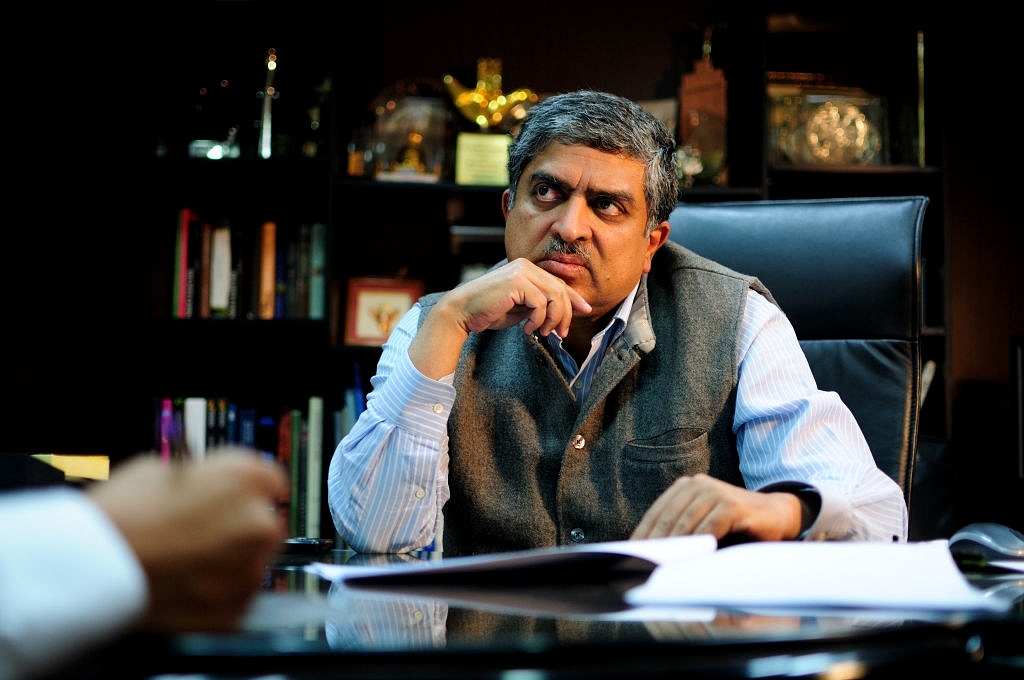Business
Nilekani Is Completely In Charge, But Only Till He Finds Infosys A CEO
- If Nandan Nilekani’s past management style is any indication, he will be hands-on with everything, but once an Infosys CEO is appointed, he will step back

Nandan Nilekani photographed during an interview at his office in New Delhi. (Pradeep Gaur/Mint via Getty Images)
I think it was my first boss (Ramanujam Sridhar; and this was in advertising) who told me about this “really interesting” (Sridhar never used words like cool) company called Infosys in which he owned some shares. This was in the early 1990s—I discovered shortly after I quit advertising and became a journalist that Infosys was one of the first beneficiaries of India’s first wave of liberalisation; the then finance minister Manmohan Singh had scrapped the Capital Controller of India (the predecessor of the Securities and Exchange Board of India) along with all its antiquated restrictions; if that hadn’t happened, Infosys wouldn’t have been able to sell shares to the public.
Sridhar told me that a friend of his from the informal quizzing group they were part of worked for the company and had convinced him to buy the shares. Years later, I met two other members of the same quizzing group who told me that this “friend” was actually a co-founder of the company, Nandan Nilekani, and that he had actually toted around prospectuses and application forms in a battered black briefcase to the quizzing group’s weekly meeting to pitch his company’s shares.
Most people in the group had bought the shares.
Nilekani makes friends easily. At Infosys, it was clear from very early on that he was co-founder N R Narayana Murthy’s undesignated successor, and more importantly, equal. Many of the other co-founders, barring N S Raghavan, who left in 2000, worshipped Murthy—much like the company’s young employees. All of them liked Nilekani. He was never Murthy’s man, something everyone would do well to remember as he starts his second stint at Infosys. Here is a man who can’t just stand up to Murthy, but also convince him—and with no unpleasantness.
The past few years at Infosys have been characterised by leaks and counter-leaks by shareholders, directors, and employees, all seeking to further their own agenda. Nilekani’s entry should change that and will probably see more changes in the company’s board (it has already seen some), management, and the strategy it has pursued these past three years under Vishal Sikka.
There has been concern in some quarters (including Mint’s own team of analysts) about Nilekani’s ability to turn things around at Infosys. This is a legitimate concern because the IT services business today isn’t what it was a decade ago (Nilekani stepped down as CEO of Infosys in 2007). But strategy and planning at Infosys was the strongest it has ever been between 2002 and 2007, when Nilekani was CEO. On paper at least, Nilekani seems to get it—as anyone who has listened to his recent talks on data and disruption will confirm—but it remains to be seen if he can translate this into a coherent strategy for the company, and then make sure this is implemented.
As Mint’s Anirban Sen and Varun Sood put it, Nilekani’s current designation may be non-executive chairman, but he is clearly in complete charge of the company, somewhat like a “super CEO”. Hours after his re-entry, he had already appointed Egon Zehnder, a head-hunting firm that specialises in finding CEOs, to find one for Infosys.
If Nilekani’s past management style is any indication, in the time it takes, he will be hands-on with everything, but once a CEO is appointed, he will step back. In the two decades that I have known him, the thing about Nilekani that has struck me the most is his willingness and ability to delegate—usually to the right people.
Introducing ElectionsHQ + 50 Ground Reports Project
The 2024 elections might seem easy to guess, but there are some important questions that shouldn't be missed.
Do freebies still sway voters? Do people prioritise infrastructure when voting? How will Punjab vote?
The answers to these questions provide great insights into where we, as a country, are headed in the years to come.
Swarajya is starting a project with an aim to do 50 solid ground stories and a smart commentary service on WhatsApp, a one-of-a-kind. We'd love your support during this election season.
Click below to contribute.
Latest